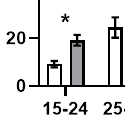Hot Off the Press – June 27, 2023 Published in The Journal of Neuroscience by Javier Rubio and Bruce Hope, et al. of the NIDA IRP Neuronal Ensembles in Drug Addiction Section. The study is a novel approach to study molecular alterations in individual synapses using Flow Cytometry of Synaptoneurosomes (FCS). The FCS approach was… [Read More]
News Main
Overdose mortality rates for opioids and stimulant drugs are substantially higher in men than in women: state-level analysis
Hot Off the Press – June 22, 2023 A new collaborative study coauthored by investigators from Mount Sinai School of Medicine, NIDA-IRP, and NIDA-HQ showed that fatal overdoses on opioids or psychostimulants are 2-3 times more common in men than in women. This sex difference is far larger than those seen in most health-related behaviors. … [Read More]
Technology Development Initiative – Paper of the Month – June 2023
The Successor Representation: Its Computational Logic and Neural Substrates. J Neurosci.
In this paper, Gershman presents and builds upon a reinforcement learning algorithm first proposed by Peter Dayan in 1993, called the successor representation, which solves some important problems that previous classes of reinforcement learning algorithms have had. Recent research has supported the idea that humans and other animals use successor representations for learning and decision making under some conditions and has proposed that dopaminergic mechanisms could build successor representations in the brain. [Read More]
Mu Opioid Receptor Activation Mediates (S)-ketamine Reinforcement in Rats: Implications for Abuse Liability
Featured Paper of the Month – June 2023
Published in Biological Psychiatry by Marjorie Levinstein and Michael Michaelides, et al. of the NIDA IRP Biobehavioral Imaging and Molecular Neuropsychopharmacology Unit.
In this study, we show that S-ketamine not only binds to and activates MOR, but that this interaction is critical for its abuse liability. Specifically, we show that the opioid receptor antagonist naltrexone blocks brain activation by (S)-ketamine in the nucleus accumbens, a region crucial for reward, and also decreases lever pressing for (S)-ketamine in rats.
2023 Outstanding Poster Awards
Congratulations to our 2023 Outstanding Poster Award winners! They were honored at the 11th annual NIDA Poster Day and Mentoring Awards ceremony on May 11, 2023. Back row, left to right: Sarah Claypool, Qingfang Liu, Samanth Lee, Michelle Tsai, Ana Armenta Vega, Kelsey Shimoda, Noelle Henein, Laura Grasso, and Kareem Woods. Front row, left to right:… [Read More]
2023 NIDA IRP Mentoring Awards
Congratulations to our 2023 Mentoring Award winners! They were honored at the 11th annual NIDA Poster Day and Mentoring Awards ceremony on May 11, 2023. From left to right: Gisela Camacho Hernandez, Ph.D. – Postdoctoral Mentoring Award; Yosuke Arima, Ph.D. – Postdoctoral Fellow Mentoring Award; Mehdi Farokhnia, M.D., M.P.H. – Staff Scientist Mentoring Award; and David… [Read More]
2023 NIDA IRP Postbaccalaureate Graduates
Congratulations and best wishes to the 2023 NIDA IRP Postbaccalaureate graduates!
AI-based analysis of social media language predicts addiction treatment dropout at 90 days
Hot Off the Press – May 23, 2023 Published in Neuropsychopharmacology by Brenda Curtis and Salvatore Giorgi of the NIDA IRP Technology and Translational Research Unit in collaboration with other researchers. Summary Assessing an individual’s risk of substance use treatment dropout traditionally involves comprehensive, structured interviews which are time consuming and costly to administer. More… [Read More]
Role of Piriform Cortex and Its Afferent Projections in Relapse to Fentanyl Seeking after Food Choice-Induced Voluntary Abstinence
Hot Off the Press – May 18, 2023 Summary NIDA researchers previously showed a role of Pir in fentanyl relapse after food choice-induced voluntary abstinence in rats, a procedure mimicking human abstinence or a significant reduction in drug self-administration because of the availability of alternative nondrug rewards. Here, they aimed to further characterize the role… [Read More]
Dopaminergic prediction errors in the ventral tegmental area reflect a multithreaded predictive model
Hot Off the Press – May 5, 2023 Published in Nature Neuroscience by Yuji Takahashi, Thomas Stalnaker, Lauren Mueller, and Geoffrey Schoenbaum of the NIDA IRP Behavioral Neurophysiology Neuroscience Section. Summary Dopamine neurons signal reward prediction errors – critical teaching signals that are broadcast throughout the brain to undergird associative learning. Current models applied to… [Read More]










